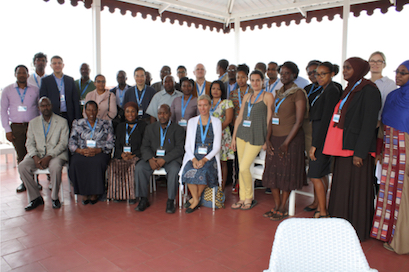
FIDEA Regional Workshop
The need to train fisheries scientists and managers in stock assessment methods in the Western Indian Ocean region (WIO) is one of the core objectives of the FIDEA (Fisheries Data East Africa) project implemented under the MeerWissen initiative and funded by the German Federal Ministry for Economic Cooperation and Development. Accordingly, a two-week training course on the assessment of stock status and the estimation of the Sustainable Development Goal 14.4.1 Indicator (the proportion of fish stocks within biologically sustainable levels) was jointly organized by the Leibniz Centre for Tropical Marine Research (ZMT) Bremen, the Food and Agriculture Organization of the United Nations (FAO), the Western Indian Ocean Marine Science Association (WIOMSA), the National Institute of Aquatic Resources in Denmark (DTU Aqua) and the Institute of Marine Sciences (IMS) in Zanzibar (March 2nd – 13th). The objectives of the workshop were to provide both the purpose and theoretical basis of stock assessments and hands-on application of how to choose and apply appropriate tools for assessment for the estimation and reporting of SDG Indicator 14.4.1. A total of 149 applicants from three continents applied for the course, with the majority of the applicants coming from the WIO region, further highlighting the great need for such kind of training in the region.
The workshop, which was officially opened by Dr. Omar Amir, the Deputy Principal Secretary in the Ministry of Agriculture, Natural Resources, Livestock, and Fisheries, Zanzibar and Ms. Julia Hannig, the head of Development Cooperation in the German International Cooperation (GiZ), Tanzania, was all together attended by 30 participants drawn from 12 countries including observers from the WorldFish Center and the Minderoo Foundation in Australia. The workshop was held in two sessions and was comprised of a series of lectures interposed with a hands-on practical use of stock assessment tools. The first session, held from 2nd- 4th, March 2020, provided an opportunity for policymakers from Kenya, Tanzania and Mozambique to discuss the current national fisheries data systems, their strengths and weaknesses and suggestions for improvements. The second session, 4th-13th March, concentrated upon the concepts and monitoring process of the SDG Indicator 14.4.1. and the data needs for estimation and reporting. Key highlights from the workshop include the official launch of the FAO E-learning course on SDG Indicator 14.4.1 (Link) and the Stock Monitoring tools in the Virtual Research Environment: Link, which all participants were able to register to and are currently using for self-paced learning. Besides, the participants were introduced to some classical stock assessment tools and data-limited approaches, including ELEFAN+, LBSPR, CMSY and SPiCT, allowing them to apply these tools to the data from their respective countries. At the end of the workshop, all participants presented their reports with the results of the stocks analysed for their country.
Further, action plans were developed at the country level for indicative planning for follow-up activities to ensure that participants get started and translate their learning into practice to help their countries monitor and report on the status of their fish stocks. Among the activities to be implemented, is a commitment by the participants to share and disseminate the acquired skills with working groups and colleagues at their home institutions. They promised to continue with the SDG 14.4.1 eLearning course and to involve stakeholders to review and set up the reference list of stocks to be assessed with the introduced tools and to revise and resubmit their report to FAO on their countries status in reporting on the SDG 14.4.1 indicator. The consensus was that a follow-up workshop/training should be conducted within six months to maintain momentum, to review progress and share good practices.
Download Workshop report